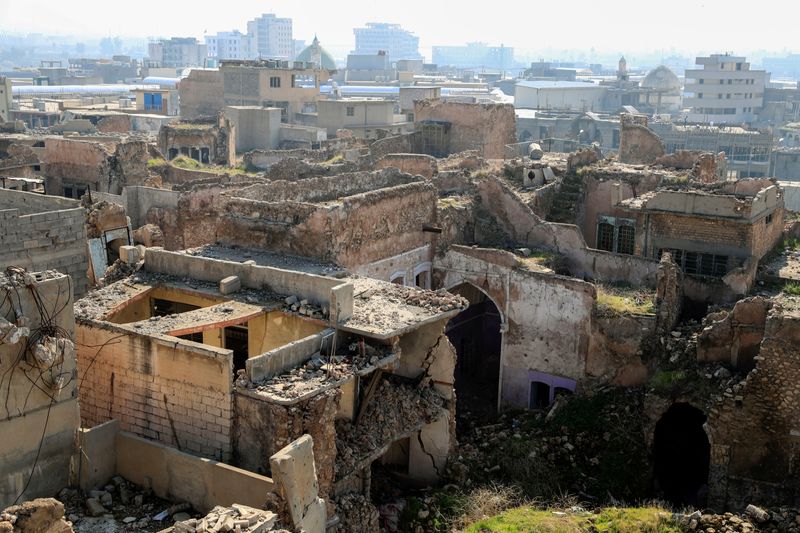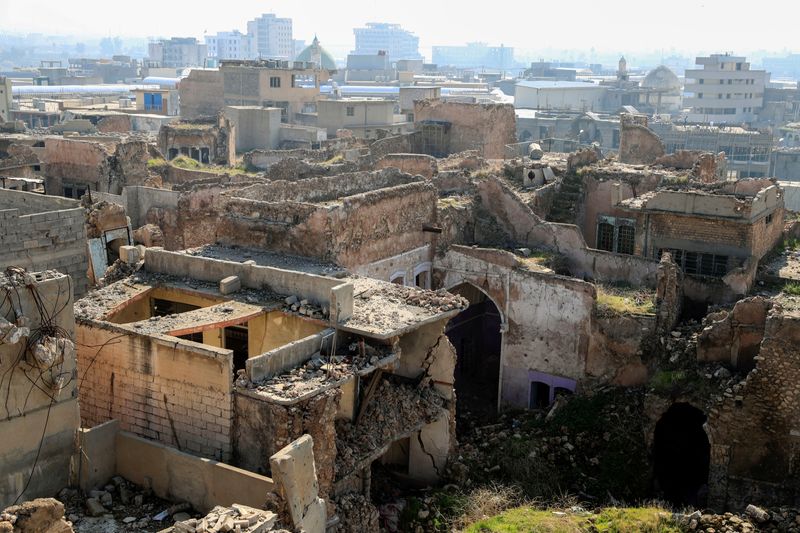
Al-Monitor, February 26, 2021, Fehim Taştekin, image: Reuters/Thaier al-Sudani
Turkey’s increasing focus on Iraq’s Sinjar region is linked to a broader rivalry with Iran for influence over Mosul.
Turkey’s quest for a military campaign to drive Kurdish militants out of the northern Iraqi region of Sinjar has refueled the Turkish-Iranian rivalry for influence in oil-rich Mosul, which many Turks see as a lost Ottoman legacy.
Earlier this week, Iranian Foreign Minister Mohammad Javad Zarif was quoted as saying that Tehran “reject[s] the Turkish military presence in Syria and Iraq and consider[s] Ankara’s policies toward Damascus and Baghdad to be wrong.” In remarks to a Turkish news agency, an unnamed Iranian Foreign Ministry official denied Zarif had made the remarks, yet the rift between the two countries is showing on the ground.
While Turkey was targeting camps of the outlawed Kurdistan Workers Party (PKK) in the Gara mountains in northern Iraq in mid-February, the Popular Mobilization Units — an Iranian-backed Iraqi militia known also as Hashd al-Shabi — deployed three brigades to Sinjar, which lies to the west of Mosul along the Syrian border. Militia commanders made it clear the deployment was meant to counter Turkey’s “threat” in the region.
Turkey cites the PKK presence in Sinjar as the cause for its concern, but its calculations go farther to Mosul. Iran, for its part, highlights the need to prevent the revival of the Islamic State, but it, too, has a broader calculus.
For many in Turkey, especially those on the right of the political spectrum, Mosul remains a “lost homeland” that slipped through Turkish fingers as the Ottoman Empire collapsed. Various governments have used the issue to spice up their regional policies over the years. Under the Justice and Development Party (AKP), Ankara has only fueled Arab suspicions by questioning the treaties that led to the disintegration of the Ottoman Empire and fixed Turkey’s current borders.
The AKP has tended to view Mosul in the Ottoman administrative framework — that is, the Mosul Vilayet, comprised of the districts of Mosul, Kirkuk and Sulaimaniyah. In other words, Sulaimaniyah, Erbil and Dohuk, the three regions that make Iraqi Kurdistan today, were part of the Ottoman Mosul province. Tellingly, the AKP has encouraged the Turkmens of Kirkuk and Tell Afar to collaborate with the Kurds. The underlying thinking of such perspectives — never declared politically but discussed hypothetically — holds that since Turkey has failed to prevent the emergence of an autonomous Kurdistan, then the entire historical Mosul Vilayet should become autonomous and Turkey should lie in wait for an opportunity to annex the region.
The Ottomans lost the Mosul Vilayet to the British in 1918 as the empire faced a disastrous defeat in World War I. In the 1920 manifesto of the ensuing Turkish liberation war, Mosul figured inside the targeted national borders. Eventually, Turkey relinquished its claim on Mosul under a 1926 treaty, but not without a price. Starting from 1934, 10% of Mosul’s oil revenues would flow to Turkey’s coffers over 25 years. That chapter was closed in 1986, when then-premier Turgut Ozal wrote off Iraqi arrears in a gesture to Saddam Hussein.
When the United States struck Iraq in 1991, Ozal was eager to back the campaign, driven by dreams of retrieving the Mosul Vilayet. Similar thoughts had stirred Prime Minister Adnan Menderes in 1958 as Iraq sought to unite with Jordan. Menderes sent intelligence operatives to Mosul and Kirkuk to test the waters, should Washington give the nod.
After the US-led invasion of Iraq in 2003, the AKP sought to both expand Turkish influence in Iraq and curb that of Iran by boosting commercial ties with Iraqi Kurdistan and cultivating bonds with the Turkmens via the Iraqi Turkmen Front and with Sunni Arabs via figures such as former Mosul Governor Atheel al-Nujaifi. Friends of Turkey in Iraq would caution that Ankara was teaming up with the wrong partners, but their advice fell on deaf ears.
Ankara’s Sunni patronage has badly damaged its reputation among other Iraqi groups since jihadi groups stepped up attacks on Shiite Turkmens, Christians, Yazidis and other minorities in 2006. In 2014, while locals were fleeing Mosul to escape IS, AKP leaders described IS militants as “angry” young men rebelling against Baghdad’s pro-Shiite sectarian policies. But soon, Turkey’s own consulate in Mosul fell captive to IS as Ankara downplayed warnings over the IS advance. The jihadis held 49 people, including the consul, hostage for more than three months.
Meanwhile, the Turkmens, whom Ankara saw as a natural ally due to ethnic kinship, fragmented. Looking for protection, Shiite Turkmens strengthened their ties with Shiite Arabs, shifting to the Iranian axis.
In a bid to return to the play in Mosul, Turkish troops stationed at the Bashiqa camp near Mosul trained Nujaifi’s Hashd al-Watani militia in the hope that the faction would take part in the liberation of the city. Meanwhile, Ankara vehemently opposed PMU participation in the offensive. Pro-government news outlets called the PMU a “Shiite terrorist group,” while President Recep Tayyip Erdogan argued that only Sunni Arabs, Turkmens and Sunni Kurds should stay in Mosul once the city was liberated. Ultimately, Ankara’s objections fell flat, as did its plan to gain influence via Hashd al-Watani.
At present, Turkey is trying to return to Mosul via public entities involved in humanitarian work, but has yet to reopen its consulate, though it has rented a new building and named a consul-general. Baghdad has dragged its feet on approving the reopening, with parties hostile to Turkey apparently undermining the process. Coalition warplanes destroyed the old consulate building in a 2016 raid against IS militants occupying the compound. Currently, only a Turkish visa application center is open in Mosul, run by a company commissioned by Ankara.
In contrast, Iran has gained considerable influence in Mosul via its PMU allies, which have stayed in the city after its liberation. PMU forces, involving local Christian and Sunni groups, collaborated with the Shingal Resistance Units (YBS), a Yazidi militia created by the PKK, in the liberation of Sinjar.
A Turkmen source from Mosul observed to Al-Monitor that Shiite Turkmens, Yazidis and other minorities in the region value the role of the PMU. This attitude gives Iran room to increase its influence, while also pursuing economic projects.
For many in Turkey, the PMU-YBS link translates to an Iran-PKK link. Similarly, it nourishes concern in Erbil that Baghdad and Tehran are acquiescing to the PKK presence in Sinjar to prevent the peshmerga forces’ return to disputed territories.
From Iran’s perspective, local support lines increase the value of the Mosul-Sinjar route to the Iraqi-Syrian border. The Rabia border crossing to the north of Sinjar as well as a nearby unofficial one that IS used to cross to Syria are now controlled jointly by the PMU and the Iraqi military. On the Syrian side, both areas are controlled by the US-backed, Kurdish-led Syrian Democratic Forces, meaning that Iran does not have a free hand on the border at present. Anyway, it is investing for the future. The al-Qaim crossing in Anbar is currently Iran’s point of entry to Syria. Although Iran-linked groups hold sway in the area, the crossing is not considered convenient enough because it opens up to Sunni areas on both sides of the border.
The Mosul equilibrium is in Iran’s favor for now. Yet, Iran is still at the beginning of the road, on which Turkey got lost with a sectarian detour. Sunni anger with Shiite militias in Mosul is steadily brewing as ongoing power struggles, sectarian strife and corruption cripple the city’s recovery.
Whether Ankara has learned a lesson from its mistakes remains to be seen. The Shiite Turkmens’ resentment with Turkey has yet to heal, while some Sunni leaders, to whom Ankara had an easy access, have come to collaborate with Iran or the Saudi-Emirati axis.
US interventions have occasionally curbed Iran, but the stumbling blocks for Turkey remain. Moreover, the scores from the US-Iran arm-wrestling are not always in US favor. Under the US-backed Sinjar deal that Erbil and Baghdad sealed in October, federal forces were supposed to replace the PMU and the YBS. Yet, the PMU has since reinforced its presence on the ground.
Sunnis in Mosul may be willing to cooperate with Turkey, but Ankara needs inclusive policies to overcome the Shiite barrier, as the failures of its hitherto policy show.
Share the post « Fehim Taştekin “Turkish-Iranian rivalry heats up over Mosul” »

